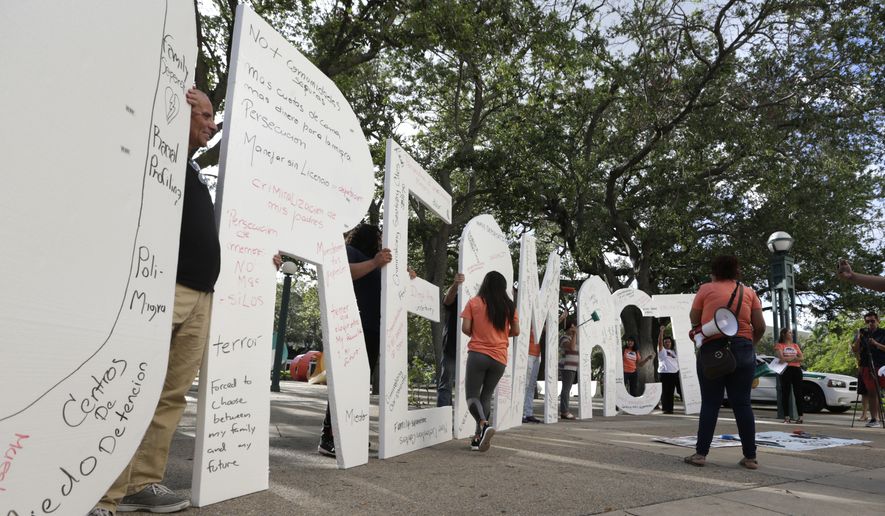The Supreme Court said Friday it will hear a series of cases challenging President Trump’s attempt to cancel the Obama-era DACA deportation amnesty, putting the issue on the front-burner for the justices’ new term in the fall.
Justice Department lawyers had asked the court to speed the case to be heard in the current term, which ended Friday. But they declined to do that, and delayed an announcement on whether they would take the case until the final day.
The case instantly vaults to the top of the list of high-profile issues on the court’s docket for next year — and it will likely be decided in the middle of a raging presidential campaign.
Other cases the court lined up for the new term, which begins in October, include deciding whether the Civil Rights Act governing sex discrimination, as written, covers sexual orientation or transgender persons; a look at Montana’s school choice program and a test of whether insurance companies are entitled to some $12 billion in Obamacare money.
The court has also said it will take a case involving a gun control law out of New York governing transport of weapons — though state officials, fearing a precedent-setting loss, are trying to make the case disappear.
On DACA, the issue is the 2012 program President Obama and then-Homeland Security Secretary Janet Napolitano created through executive action, granting a full stay of deportation and awarding work permits to hundreds of thousands of illegal immigrants.
They call themselves “Dreamers” after a piece of federal legislation, the Dream Act, which would grant a full pathway to citizenship.
They were young adult migrants who came to the U.S. as juveniles — and who have long been the most sympathetic figures in the illegal immigration debate.
The Dream Act has never passed both the House and Senate in the same Congress — but Mr. Obama claimed executive powers to extend a watered-down version with an expansive use of what’s known as deferred action, which includes the stay of deportation and awarding of some taxpayer benefits, though not a permanent legal status.
Mr. Trump, in September 2017, announced he was canceling DACA, saying it was an illegal use of presidential power — though he hoped Congress would act to protect the migrants.
Democrat-led states, immigrant-rights advocates and liberal members of Congress challenged the decision, saying the president cut too many corners in his decision.
One judge sided with Mr. Trump while several others ruled against him.
Meanwhile another federal judge ruled against the original Obama-era DACA program itself, ruling that the administration in 2012 likely broke the same procedural laws in creating the program that Mr. Trump is accused of breaking now.
Those legal battles played out even as Congress remained gridlocked.
Mr. Trump offered a plan that would have coupled granting citizenship rights to some Dreamers with border wall funding and changes to some legal immigration programs. Democrats rejected that, insisting on a “clean” bill — the Dream Act — that would only include a broad grant of citizenship.
Liberal activists said they were worried by the Supreme Court’s decision to take the case, fearing it means they will reject the lower court rulings that blocked Mr. Trump.
Tom Jawetz, vice president of immigration policy at the Center for American Progress, called it “an unnecessary intervention that will only increase the anxiety for hundreds of thousands of current DACA recipients.”
Other activists vowed to punish President Trump and Republicans in next year’s elections.
“We cannot just rely on the Supreme Court to do what’s right by our community, given how conservative the court has become. That’s why 2020 will be the most consequential election of our lifetime,” said Melissa Mark-Viverito, interim president of the Latino Victory Project.
For now, DACA remains in effect, protecting nearly 670,000 Dreamers as of April.
New applications aren’t allowed, but current beneficiaries can apply for renewal under the lower courts’ rulings.
• Stephen Dinan can be reached at sdinan@washingtontimes.com.




Please read our comment policy before commenting.